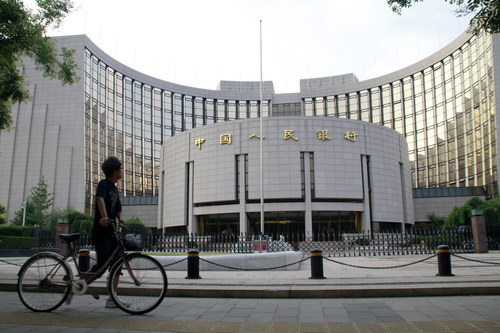Policy near inflection point
Updated: 2011-09-09 07:48
By Chen Jia (China Daily)
|
|||||||||||
 The headquarters of the People's Bank of China in Beijing. The central bank might end the cycle of interest rate hikes and cut the required reserve ratio to stimulate economic growth.?[Photo/China Daily] |
Emphasis on corporate financial conditions, achieving soft landing
BEIJING - China's monetary policy stance might be at an inflection point after nearly 11 months of tightening, influenced by continued ultra-loose policies in developed economics that are seeking to preserve the fragile global recovery.
The Chinese government might end the cycle of interest rate hikes that started in the fourth quarter of 2010 and cut commercial banks' required reserve ratio (RRR) to stimulate economic growth and adapt to international monetary conditions, analysts said.
Wang Jun, a senior economist with the China Center for International Economic Exchanges, a top government think tank, told China Daily that Chinese authorities are likely to lower the RRR in the fourth quarter to support corporate cash flows and achieve an economic "soft landing".
Finance ministers from the Group of Seven are scheduled to meet on Sept 9 in Marseille, France for talks on how to support the deteriorating world economy. The ministers are expected to call for continued loose monetary policy to ease fears of a worldwide "double-dip recession".
Also, US President Barack Obama will address a joint session of Congress on Sept 8, where he is expected to propose spending more than $300 billion to spur job creation, according to Bloomberg News.
In addition, Federal Reserve Board Chairman Ben Bernanke is scheduled to discuss the US economy on Thursday. He might give a policy outlook ahead of the Fed's official two-day meeting on Sept 20.
If the US launches a new stimulus policy, "the flood of money will hurt the Chinese economy by increasing market liquidity and speculative hot money, which can further lift inflation", said Wang.
The People's Bank of China (PBOC), the central bank, raised benchmark interest rates five times since October 2010 and increased the RRR six times in 2011 to help curb soaring consumer prices.
Considering the still-high rate of inflation, which reached a 37-month high with a consumer price index of 6.5 percent in July, the PBOC ordered commercial banks to put a total of 900 billion yuan ($140.8 billion) into reserves over the six-month period that started on Sept 5, a new approach to cut market liquidity.
The effect of this measure is nearly equivalent to raising the RRR by 75 basis points, and liquidity would be tight after that, said Li Xunlei, the chief economist at Guotai Junan Securities Co Ltd.
"It is less possible to raise interest rates again this year. The central bank may reduce the RRR this November to release liquidity, because small commercial banks have already been hurt," Li said.
However, Lu Zhengwei, chief economist with Industrial Bank Co Ltd, said China should not ease monetary policy before the end of the first quarter of 2012.
Excess liquidity is likely to attract more speculative capital and boost asset bubbles, which could mean a financial crisis in China. "It is so dangerous. I suggest keeping monetary policy stable with no decrease in the RRR," Lu said.













